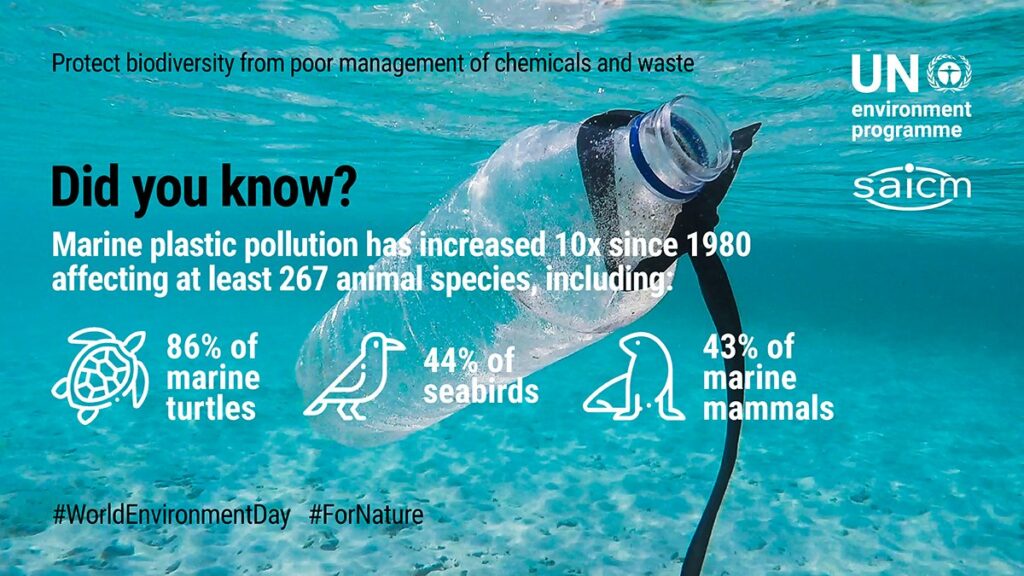Ahmedabad
(Head Office)Address : 506, 3rd EYE THREE (III), Opp. Induben Khakhrawala, Girish Cold Drink Cross Road, CG Road, Navrangpura, Ahmedabad, 380009.
Mobile : 8469231587 / 9586028957
Telephone : 079-40098991
E-mail: dics.upsc@gmail.com

Towards Eliminating Plastic Pollution by 2040
News: Recently, The Organisation for Economic Co-operation and Development (OECD) released an interim report (titled “Towards Eliminating Plastic Pollution by 2040: A Policy Scenario Analysis”).
Plastic waste generation and its impact:
• About 350 million tonnes of plastic waste are generated every year of which less than 10 percent is recycled, about 15 percent is incinerated while the remaining is dumped in landfills or littered on land, rivers, lakes, and the oceans.
• Health: Plastics can take up to 500 years or more to decompose and emit harmful pollutants that degrade the environment and are harmful to humans, and animals including livestock, aquatic, and marine life.
• Environment: Plastic waste dumped in soils affect soil quality, soil biodiversity, and groundwater aquifers.
• Biodiversity: Cases of wild animals, birds and cattle dying due to the ingestion of microplastics are not uncommon.
• Traces of microplastics have been found in breast milk, tap water and the bloodstream of humans.
Key Findings:
• Plastic pollution poses an increasing threat to the environment, impacting habitats and natural ecosystems, with consequences for sustainable economic growth and human wellbeing.
• The report said 21 million tonnes of plastics leak into the environment globally in 2022.
• The document highlights that global ambition with early, stringent and co-ordinated policy action could cut plastic waste generation in 2040 by a quarter below baseline.
• It could virtually eliminate mismanaged waste by 2040 (from 119 to 4 MT), it suggested. As a result, plastic leakage would also be nearly eliminated (1.2 MT in 2040)
• These are interim findings from this ongoing line of work. The full report, containing a more in-depth analysis and more detailed policy guidance, will be published in the first half of 2024.
Key Recommendations:
• The report suggested to implement targeted taxes and regulations on avoidable plastics. For example, India’s ban on Single use plastics.
• Design products in a way that promotes its circular usage. Setting criteria that promote reuse is crucial to mitigate plastic pollution.
• Encourage effective waste collection and disposal methods.
India’s initiatives to curb Plastic usage
• Elimination of Single Use Plastic
• Plastic Waste management rules, 2016
• Encourage sustainable practices via Mission Life
• Project REPLAN (KVIC) – To reduce consumption of plastic bags by providing a more sustainable alternative

Address : 506, 3rd EYE THREE (III), Opp. Induben Khakhrawala, Girish Cold Drink Cross Road, CG Road, Navrangpura, Ahmedabad, 380009.
Mobile : 8469231587 / 9586028957
Telephone : 079-40098991
E-mail: dics.upsc@gmail.com
Address: A-306, The Landmark, Urjanagar-1, Opp. Spicy Street, Kudasan – Por Road, Kudasan, Gandhinagar – 382421
Mobile : 9723832444 / 9723932444
E-mail: dics.gnagar@gmail.com
Address: 2nd Floor, 9 Shivali Society, L&T Circle, opp. Ratri Bazar, Karelibaugh, Vadodara, 390018
Mobile : 9725692037 / 9725692054
E-mail: dics.vadodara@gmail.com
Address: 403, Raj Victoria, Opp. Pal Walkway, Near Galaxy Circle, Pal, Surat-394510
Mobile : 8401031583 / 8401031587
E-mail: dics.surat@gmail.com
Address: 303,305 K 158 Complex Above Magson, Sindhubhavan Road Ahmedabad-380059
Mobile : 9974751177 / 8469231587
E-mail: dicssbr@gmail.com
Address: 57/17, 2nd Floor, Old Rajinder Nagar Market, Bada Bazaar Marg, Delhi-60
Mobile : 9104830862 / 9104830865
E-mail: dics.newdelhi@gmail.com